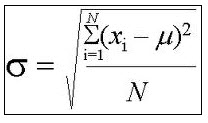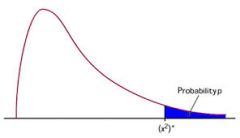Chebyshev’s Rule Calculator
Instructions: This Chebyshev's Rule calculator will show you how to use Chebyshev's Inequality to estimate probabilities of an arbitrary distribution. You can estimate the probability that a random variable \(X\) is within \(k\) standard deviations of the mean, by typing the value of \(k\) in the form below; OR specify the population mean \(\mu\), population standard deviation \(\sigma\) and the even \((a,b)\) for which you want to estimate the probability:
More About the Chebyshev's Inequality Calculator
We use Chebyshev's inequality to compute the probability that \(X\) is within \(k\) standard deviations of the mean. According to Chebyshev's rule, the probability that \(X\) is within \(k\) standard deviations of the mean can be estimated as follows:
\[ \Pr(|X - \mu| < k \sigma) \ge 1 - \frac{1}{k^2} \]Chebyshev's inequality is very powerful, because it applies to any generic distribution. If you are dealing with a normal distribution, you should use our empirical rule instead .




